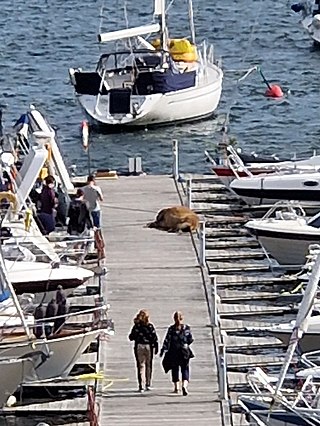Freya, or Freyja, is a goddess in Norse mythology.
Contents
- Music and performers
- Other people
- Plants and animals
- Fiction
- Ships
- Mountains
- Other subjects
- See also
Freya may refer to:
Freya, or Freyja, is a goddess in Norse mythology.
Freya may refer to:

In Norse mythology, Brísingamen is the torc or necklace of the goddess Freyja, of which little else is known for certain.

In Norse mythology, Freyja is a goddess associated with love, beauty, fertility, sex, war, gold, and seiðr. Freyja is the owner of the necklace Brísingamen, rides a chariot pulled by two cats, is accompanied by the boar Hildisvíni, and possesses a cloak of falcon feathers. By her husband Óðr, she is the mother of two daughters, Hnoss and Gersemi. Along with her twin brother Freyr, her father Njörðr, and her mother, she is a member of the Vanir. Stemming from Old Norse Freyja, modern forms of the name include Freya, Freyia, and Freja.
Nanna may refer to:
A saga is a story in Old Norse about ancient Scandinavian and Germanic history.
Terra may often refer to:
Freja may refer to:
The Frigg and Freyja common origin hypothesis holds that the Old Norse goddesses Frigg and Freyja descend from a common Proto-Germanic figure, as suggested by the numerous similarities found between the two deities. Scholar Stephan Grundy comments that "the problem of whether Frigg or Freyja may have been a single goddess originally is a difficult one, made more so by the scantiness of pre-Viking Age references to Germanic goddesses, and the diverse quality of the sources. The best that can be done is to survey the arguments for and against their identity, and to see how well each can be supported."
Thor is a Germanic god associated with thunder.
Odin is the chief god of the Norse pantheon.
Freia may refer to:

Freya was an early warning radar deployed by Germany during World War II; it was named after the Norse goddess Freyja. During the war, over a thousand stations were built. A naval version operating on a slightly different wavelength was also developed as the Seetakt.
Nana, Nanna, Na Na or NANA may refer to:
The Norse mythology, preserved ancient Icelandic texts such as the Poetic Edda, the Prose Edda, and other lays and sagas, was little known outside Scandinavia until the 19th century. With the widespread publication of Norse myths and legends at this time, references to the Norse gods and heroes spread into European literary culture, especially in Scandinavia, Germany, and Britain. In the later 20th century, references to Norse mythology became common in science fiction and fantasy literature, role-playing games, and eventually other cultural products such as Japanese animation. Storytelling was an important aspect of Norse mythology and centuries later, with the rediscovery of the myth, Norse mythology once again relies on the impacts of storytelling to spread its agenda.
Freyja is a goddess in Norse mythology.
Frøydis or Freydis is a Norwegian female first name. It is from the Norse god Frøya's name and dís (goddess).
Chloe is a feminine given name.

Freya is an Old Norse feminine given name derived from the name of the Old Norse word for noble lady (Freyja). The theonym of the goddess Freyja is thus considered to have been an epithet in origin, replacing a personal name that is now unattested.

In Norse mythology, Gefjon is a goddess associated with ploughing, the Danish island of Zealand, the legendary Swedish king Gylfi, the legendary Danish king Skjöldr, foreknowledge, her oxen children, and virginity. Gefjon is attested in the Poetic Edda, compiled in the 13th century from earlier traditional sources; the Prose Edda and Heimskringla, written in the 13th century by Snorri Sturluson; in the works of skalds; and appears as a gloss for various Greco-Roman goddesses in some Old Norse translations of Latin works.
Freya alba is a South American species of flowering plant in the daisy family, Asteraceae, and the only species in the genus Freya.

Freya was a young female walrus who appeared along the coasts of several western European countries from October 2021 until her death on 14 August 2022. A rare sighting in the areas where she appeared, she attracted the attention of wildlife enthusiasts and the wider public. In the summer of 2022, after sunbathing on and sinking boats in the Oslofjord, she was shot after concerns about her and the public's safety. She weighed approximately 600 kilograms (1,300 lb). The decision to kill Freya was criticised by many wildlife experts.